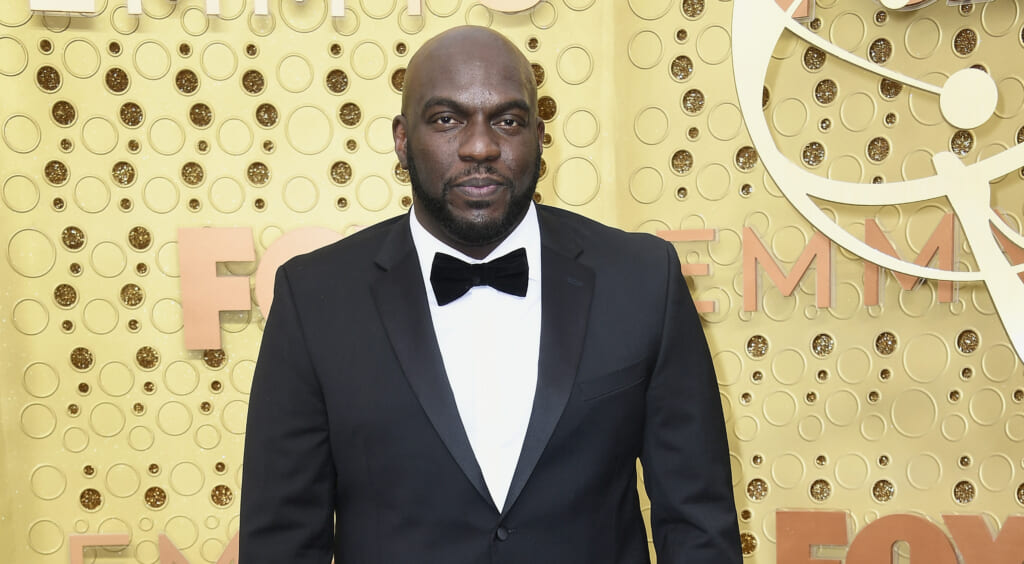Omar Dorsey unpacks ‘Genius: Aretha’ on ‘Acting Up’ podcast
"[The series] was the first thing that I did after my brother passed and it’s going to always mean something to me"
Omar Dorsey, a Black Reels award-winning actor, has been gracing the big and small screens for years. He’s been featured in prominent movies like Selma and Harriet, along with TV shows like Queen Sugar and Ray Donovan.
On the podcast Acting Up, he sat down with Cortney Wills to discuss in-depth his role in the biopic series Genius: Aretha, which according to the National Geographic Channel’s description, “will explore Aretha Franklin’s musical genius, her incomparable career, and the immeasurable impact she has had on music and culture.”
For the series, Dorsey transformed himself into the late James Cleveland. Cleveland was not only a Baptist minister, pianist, and gospel singer, but also taught the Queen of Soul how to sing at the mere age of 9. As far as how he got the role, Dorsey, in a manner of speaking, manifested it.
When he found out about the series he called Cynthia Erivo, who plays Aretha Franklin, and asked “‘Cynthia, who y’all got playing James Cleveland?’ She was like, ‘We’re looking at this person. Why do you want to do it?’”
Read More: Little Marvin gets real about ‘Them’ on Acting Up: ‘It was not about exploring Black trauma’

Dorsey continued, “‘[I said] Hell yeah, I want to do it.’ That was like in October..it was months before they even started shooting.” Dorsey added that he eventually “forgot about it” and months went by where he found himself dealing with the tragic news that his brother only had a few days to live.
But something magical took place one night when he randomly had a dream that Emmy award-winning director Neema Barnette told him “Omar, I need you to come with me.”
“So then my agents, my managers, call me and said, ‘You know, they want you to come and do this project. I said I’m not doing anything. I’m staying in Atlanta.'”
Although the project that his agents wanted him to was shooting in Atlanta, after losing his brother to cancer, Dorsey’s response to the call was “I don’t care. I’m not doing anything.” Shortly after, Dorsey said Barnette called him up herself and said, “Brother I need you, I want you to play James Cleveland.”
He knew it was a sign, especially because deep down he “really wanted to play James Cleveland.” The 45-year-old revealed that he and his father, who, like Cleveland, was a pastor, used to listen to Cleveland’s songs together.
“I prayed on it. After a few days I said, ‘OK, I’ll do it.’ It was the first thing that I did after my brother passed and it’s going to always mean something to me.”
Read More: Monica sends message to fans from hospital bed – ‘Forgive your parents’
The film industry is gradually expanding as more Black stories are being cultivated by Black writers, directors, and producers. Black audiences are at last able to get a refreshing taste of new content and storylines from shows like Insecure, Pose, and Lovecraft Country, to captivating movies like Judas and the Black Messiah, Soul, and Ma Rainey’s Black Bottom. Dorsey shared that he has dealt with the issue of being stereotyped, playing characters that were considered “gangster roles.”
“You have to understand. I’m a big Black dude,” he explained. “When I came in the game they always wanted to throw thug roles at me and I did some and I didn’t do some.” The 6-foot, 1-inch actor explained that after playing characters like Cookie Brown in Ray Donovan, “everybody wanted me for all of the gangster roles.”
Dorsey detailed the importance of having variety in his characters and said it’s nothing to turn down a gig if he’s not feeling it. He reveals that having the opportunity to land roles with different backgrounds and personalities is “becoming a little bit easier for [me],” but admits that he’s not sure if it’s that easy “for everybody.”
“The best thing about it is that now we are writing ourselves. We don’t have white people writing what they think Blackness looks like.”
Dorsey went on to name drop writers and directors like Ava Duvernay, Anthony Sparks, and Cheo Cokers to elaborate on his point that “we have these amazing writers now who can bring it to life. So our culture is being reflected by us now.”
Have you subscribed to theGrio’s new podcast “Dear Culture”? Download our newest episodes now!
TheGrio is now on Apple TV, Amazon Fire, and Roku. Download theGrio today!
